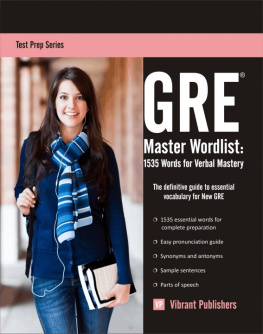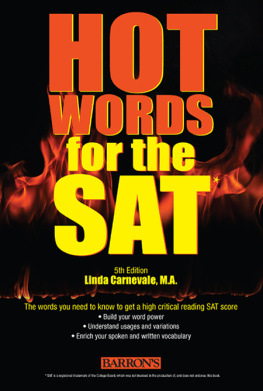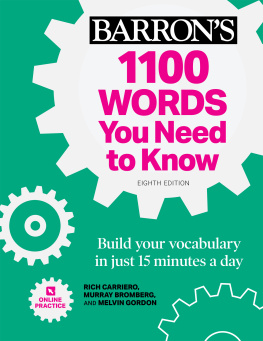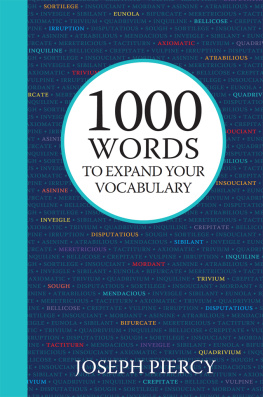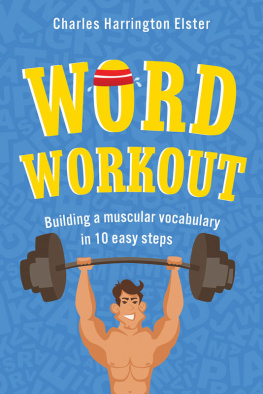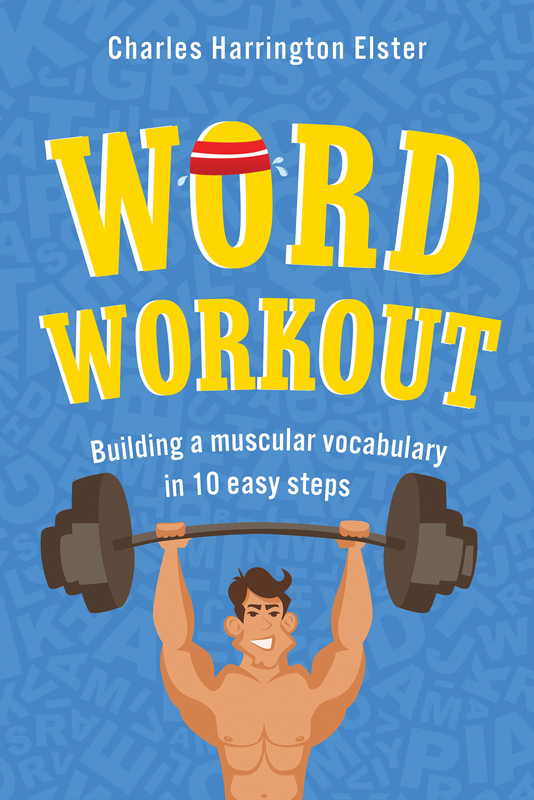Contents
Guide

The author and publisher have provided this e-book to you for your personal use only. You may not make this e-book publicly available in any way. Copyright infringement is against the law. If you believe the copy of this e-book you are reading infringes on the authors copyright, please notify the publisher at: us.macmillanusa.com/piracy.
CONTENTS
IN TODAYS FAST-PACED WORLD , a large and precise vocabulary is a tremendous asset. It is the basis of knowledge and the foundation of eloquence. If you aspire to speak and write welland think wellyou owe it to yourself to build your knowledge of words.
The notion of building your vocabulary may call to mind the dull drills of grade school. But learning new words, and learning more about words, doesnt have to be tedious. Unlike with physical exercise, you can gain without pain. Unlike with dieting, the rewards are permanent. Best of all, you can start building your vocabulary at any age and, with a minimum of effort, keep it growing for the rest of your life.
In fact, like physical exercise, which can enhance your quality of life no matter what your age, vocabulary building can help keep your brain and memory vitaleven into your nineties. Older adults can remember bigger vocabularies than younger people, says Christie Chung, associate professor of psychology at Mills College, in Oakland, California, and director of the Mills Cognition Laboratory. Our semantic memory increases as we grow older.
Building a versatile vocabulary is a form of exerciseone essential to your professional, social, and even mental health. If you believe in the benefits of exercise for your body, why not do the same for your mind? Like your muscles, your brain needs regular stretching. And a workout with words is nowhere near as taxing as twenty minutes on a StairMaster. In fact, flexing your word muscles can be downright rejuvenating. (To rejuvenate, from re-, again, and the Latin juv nis, young, means to make young again.)
Of course, words wont just come to you; you must seek them out. And thats one reason Ive written Word Workout: to make it easier for you to find, learn, and use new words. Consider me your personal trainer in all things verbal, and consider this book your personalized course in the ways and wonders of words.
Word Workout is not a set of flashcards masquerading as a book. Nor is it a monotonous march through a swamp of words. It doesnt rely on gimmicks or warmed-over pop psychology. It doesnt make you learn by rote or by hit-and-run memorization. And it doesnt take shortcuts, meaning that there arent any superficial lessons with only a definition and a sample sentence. Word Workout is the real McCoy: a comprehensive, accessible vocabulary-building program, written by a nationally recognized expert on the English language, that will teach you hundreds of relevant, vigorous words used by our most eloquent writers and speakers.
If youve already completed my first vocabulary-building program for adults, Verbal Advantage, you know this well. You know that research has shown that we learn words in order of their difficulty, from easier words to harder ones, and that the best way to build your word power is to study words in ascending order of difficulty. Thats why Word Workout, like Verbal Advantage, is a graduated program that begins with words known by most college graduates and ends with words known by only the most educated, intelligent, and well-read adults. And, even more than Verbal Advantage, Word Workout is chock-full of information about synonyms, antonyms, and word origins. Youll also get plenty of good advice on usage and pronunciation, and there are review tests all along the way to help reinforce what youve learned.
If you havent yet read Verbal Advantage, dont worry. Word Workout is modeled on Verbal Advantage, but its not a sequel or a prequel. Its a companion volume that teaches an entirely new set of words. In short, youll learn a lot if you read this book, and a whole lot more if you read both.
Words are the key to knowledge, and knowledge is the key to success. Every word you add to your vocabulary broadens your understanding of the world, improves your comprehension of what you hear and read, and sharpens your ability to express your ideas. That is the premise, and the promise, of Word Workout to help you become a more knowledgeable and confident user of the English language in the most effective and entertaining way possible.
So grab your verbal gym suit and a bottle of Evian (did you know thats naive spelled backward?) and let me pump you up with a professional word workout!
How Best to Use This Book
Like Verbal Advantage, Word Workout is arranged in ten increasingly challenging levels consisting of fifty keywords each, and each level is divided into five sets of ten keyword discussions. After each of these sets there is a review test. If you get eight answers or more right on the review test you may proceed to the next set of ten keyword discussions. But if you score fewer than eight correct you should review that set of keywords, or at least the ones you got wrong, before continuing with the program.
When it comes to building your vocabulary there is no substitute for discipline. Try to read Word Workout for a set amount of time each day, preferably thirty minutes. You will also benefit if you go over the material a second and even a third time before taking each review quiz and before beginning each new level.
Also, dont rush. You will make better progress if you take your time than if you try to ingest everything in a few big bites. And please resist the temptation to jump ahead. Its all right to follow my cross-references, but you will gain the most from Word Workout if you proceed through the lessons in order without skipping around.
aat
a final, woman
ahspa
ahrcar
airfair
ayhay
awsaw
chchip
elet
e item, novel
eesee
eerdeer
isit
i charity, April, nation
kh as in German ach, Scottish loch (a guttural sound)
lapple, cattle
mspasm
nhidden
(n)as in French bon, vin, blanc (a nasalized sound)
ngsing
o carrot, summon
ohgo
oosoon
orfor
oorpoor
owcow
oytoy
shshe
ththin
th this
u focus, column
uhup, but
urturn
uupull, took
y or eyeby, I
zhmeasure
(y)indicates that some speakers employ the y sound of you and others do not: for example, N(Y)OO, new
Syllables printed in capitals are stressed. In words with primary and secondary stress, the syllable with primary stress is printed in boldface capitals and the syllable with secondary stress is printed in roman capitals: for example, pruh-NUHN-see- AY -sh i n ( pronunciation ).
LEVEL 1
1. DEPRAVITY
2. PRESUMPTUOUS
3. GRANDIOSE
4. DISSEMINATE
5. ECLECTIC
6. SERVILE
7. VORACIOUS
8. CONVOLUTED
9. RANT
10. STRATAGEM
11. EMACIATED
12. MISGIVING
13. ADULATION
14. DEVOTEE
15. VIVACIOUS
16. ANACHRONISTIC
17. GARISH
18. QUALM
19. CONSUMMATE
20. IMPERTINENT
21. RAMIFICATION
22. ELUCIDATE
23. ADAGE
24. BESOTTED
25. RUEFUL
26. SPASMODIC
27. DETRITUS
28. AWRY
29. ENCUMBER
30. BLEMISH
31. IMPEDIMENT
32. MODICUM
33. DOSSIER
34. ALLITERATION


